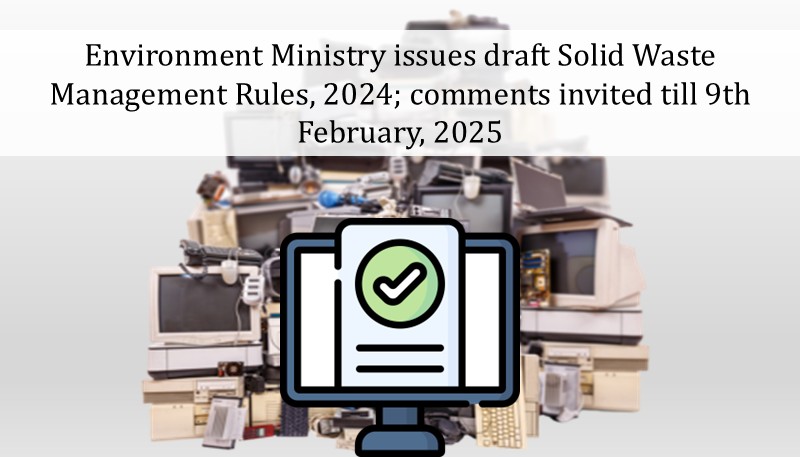Environment Ministry issues draft Solid Waste Management Rules, 2024; comments invited till 9th February, 2025

The Ministry of Environment, Forest and Climate Change has issued the draft Solid Waste Management Rules, 2024 (“Draft Rules”) and has invited comments/suggestion (if any) from the public till 9th February, 2025.
Objections or suggestions on the proposals may be addressed to the Secretary, Ministry of Environment, Forest and Climate Change, Indira Paryavaran Bhawan, Jorbagh Road, New Delhi- 110 003 or electronically through e-mail at (sohsmd-mef@gov.in).
Key Highlights:
a. The Draft Rules are applicable to every urban body as well as rural local body, including all entities within their jurisdictions whether being controlled and managed by the government, private sector or in Public Private Partnership (PPP) viz. special notified areas including industrial areas/townships, special economic zones SEZs, food parks, and areas under the control of Indian Railways including railway stations, railway tracks and land parcels adjacent to railway tracks, airports, airbases, Ports and harbours, defence establishments, public and private establishments, State and Central government organizations, places of pilgrims, religious and historical importance, all land owners public or private, individual or body corporate, in possession of land parcels, and to every domestic, institutional, commercial and any other non-residential solid waste generator situated in the areas except hazardous chemicals, bio medical wastes, and radio-active waste, that are covered under separate rules framed under the Environment(Protection) Act,1986;
b. The Draft Rules have proposed the definitions, few of which are as follows:
-
- “authorisation” means the permission given by the State/UT Government through its Department, State Pollution Control Board or Pollution Control Committee or the Local Body, as the case may be, to the operator of a facility or the local body and/or authority, or any other agency/ third party engaged in collection, segregation, sorting, transporting, recycling/ processing/disposal of solid waste as well as to those engaged in establishment, operation, and management of sanitary/ operational landfill;
- “bulk waste generator” covers the following-
- entities, given below, if they satisfy at least one of the following criterion
- buildings with floor area of 20, 000 sq.m. or above
- water consumption of 5000 litres per day
- solid waste generation of 100 kg per dayInstitutional users including buildings occupied by the
-
-
-
- Central government departments or undertakings, State government departments or undertakings,
- local bodies,
- public sector undertakings or private companies,
- schools, colleges, universities, other educational institutions
-
-
-
-
- Commercial users including
- commercial establishments including railways, bus stations/depots, airports, ports,
- malls, multiplexes ,
- hotels ,
- hospitals, nursing homes,
- hostels,
- wholesale markets, including ―Mandis, for agricultural and horticultural produce, fish and meat
- stadia, sports complexes,
- Residential societies
- Commercial users including
-
c. “waste generator” means and includes every person or group of persons, every residential premises and non-residential establishments including Indian Railways, defense establishments, which generate solid waste
- The Draft Rules have specifically laid down duties of waste generator, bulk waste generator and other entities such as registration on the through the centralized online portal, filing of annual returns, etc. to ensure Environmentally sound management of solid waste;
- The Draft Rules proposes to introduce the generation of Extended Generator Responsibility (“EGR”) Certificate for treatment of waste for fulfilment of obligations of a bulk waste generator against the solid waste handed over to registered waste processing facilities /recycler;
- The Draft Rules have specific chapters mentioning the manner of environmentally sound management of a horticultural waste and agri-residue (Chapter IV) and the duties of a waste generator of Industrial Solid Waste (Chapter V);
- Additionally, provisions with respect to imposition of Environmental Compensation (“EC”), provisions of preparing and submitting an Annual Report, provisions regarding Accident reporting, etc. have also been proposed in the Draft Rules.
Source: Ministry of Environment, Forest and Climate Change